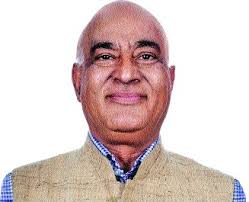Synchronised elections, voter behaviour, and governance outcomes
An active policy proposal of the Government of India is to hold national elections at the same time as the assembly elections of all the states. This article examines whether holding national and stat...
-
 Vimal Balasubramaniam
Vimal Balasubramaniam  Sabyasachi Das
Sabyasachi Das  Apurav Yash Bhatiya
Apurav Yash Bhatiya  28 August, 2020
28 August, 2020
- Articles
Political determinants of newspaper markets in India
Newspapers are an important source of political information for Indian voters. This article looks at how political factors influence the newspaper market. Using the announcement of delimitation in the...
-
 Julia Cagé
Julia Cagé  Guilhem Cassan
Guilhem Cassan  Francesca R. Jensenius
Francesca R. Jensenius  23 November, 2023
23 November, 2023
- Articles
A proposal for public funding of elections and political parties in India
The Finance Minister of India recently introduced measures aimed at cleaning up political party funding in the country. In this article, Gowda and Santhosh highlight the limitations of these measures,...
-
 M.V. Rajeev Gowda
M.V. Rajeev Gowda  Varun Santhosh
Varun Santhosh  21 April, 2017
21 April, 2017
- Perspectives
Three barriers that make it hard for policymakers to use the evidence that development researchers produce
There has been a surge in policy research globally over the past two decades that is geared to promote evidence-based policymaking. But can policymakers put this evidence to use? Based on a survey of...
-
 Michael Callen
Michael Callen  Adnan Khan
Adnan Khan  Asim Khwaja
Asim Khwaja  20 September, 2017
20 September, 2017
- Articles
Drawing the line: The short- and long-term consequences of partitioning India
Colonial rule in India culminated in the birth of two nations, forcing the displacement of millions. This column analyses the economic and political consequences of the Partition in 1947. It finds tha...
-
 Prashant Bharadwaj
Prashant Bharadwaj  Saumitra Jha
Saumitra Jha  08 September, 2017
08 September, 2017
- Articles
Political decentralisation, female leadership, and health in rural Bihar
Political decentralisation and female representation in governance are known to improve social welfare by influencing policy decisions in favour of women and children. Analysing data from rural Bihar,...
-
 Santosh Kumar
Santosh Kumar  Nishith Prakash
Nishith Prakash  23 August, 2017
23 August, 2017
- Articles
Governance and public service delivery in India
The International Growth Centre recently produced a synthesis paper (Afridi 2017) bringing together insights from its research on governance and public service delivery in India, over the past seven y...
-
 Farzana Afridi
Farzana Afridi  Nalini Gulati
Nalini Gulati  07 August, 2017
07 August, 2017
- Perspectives
Midday meals scheme: Are corruption claims exaggerated?
Soon after Aadhaar was made compulsory for availing midday meals in schools, the government claimed that the move had helped expose several instances of schools siphoning off funds under the scheme by...
-
 Monika Yadav
Monika Yadav  31 July, 2017
31 July, 2017
- Articles
Why 'free' speech is not always 'costless'
A recent CBI raid at the premises of the owners of NDTV has sparked off yet another round of debates about freedom of the media, the spectre of authoritarianism, and freedom of expression in India. In...
-
 Maitreesh Ghatak
Maitreesh Ghatak  19 July, 2017
19 July, 2017
- Perspectives
Juvenile delinquency and income disparity across Indian states
The gravity and frequency of juvenile crime incidents in recent years point towards the urgent need for rigorous analysis of the issue. Based on data from Indian states, this column shows that juvenil...
-
 Nabamita Dutta
Nabamita Dutta  Dipparna Jana
Dipparna Jana  Saibal Kar
Saibal Kar  05 June, 2017
05 June, 2017
- Articles
The development disconnect: MNREGA in Bihar's Jamui district
In this note, Amrita Dhiman describes her team’s visit to Jamui district in Bihar – the district that is supposed to have generated the highest number of person-days under MNREGA in its division i...
-
 Amrita Dhiman
Amrita Dhiman  02 June, 2017
02 June, 2017
- Notes from the Field
Aadhaar: It's not black and white
Amidst the emerging privacy concerns surrounding the success of Aadhaar and its integration in our day-to-day lives, Outline India conducted a survey in Delhi to understand people's reception of Aadh...
-
 Anindita Adhikari
Anindita Adhikari  31 May, 2017
31 May, 2017
- Perspectives
The state of the economy and mass perception
In this article, Ashwini Kulkarni of NGO Pragati Abhiyan contends that the media should tap into the knowledge of practitioners that are familiar with the ground realities of social sector schemes –...
-
 Ashwini Kulkarni
Ashwini Kulkarni  19 May, 2017
19 May, 2017
- Perspectives
A proposal for public funding of elections and political parties in India
The Finance Minister of India recently introduced measures aimed at cleaning up political party funding in the country. In this article, Gowda and Santhosh highlight the limitations of these measures,...
-
 M.V. Rajeev Gowda
M.V. Rajeev Gowda  Varun Santhosh
Varun Santhosh  21 April, 2017
21 April, 2017
- Perspectives
Consumption spikes and election delays
There is ample anecdotal evidence on political parties bribing voters with cash or consumption goods prior to elections, in India and other developing countries. However, there is an expected lack of ...
-
 Shabana Mitra
Shabana Mitra  Anirban Mitra
Anirban Mitra  Arnab Mukherji
Arnab Mukherji  20 April, 2017
20 April, 2017
- Articles
Twitter feed
Tweets by Ideas4IndiaMost Popular Governance Posts
Unique Health Identification and Aadhaar: A case for mandatory linkage
As part of the Digital India initiative, All India Institute of Medical Sciences (AIIMS) issues a Unique Health Identification (UHID) number to each patient, which documents their entire journey in th...
 Mudit Kapoor
Mudit Kapoor  23 December, 2016
23 December, 2016
- Perspectives
Caste dominance in rural India: Cause and effect
Rural India remains a caste-based society. This column explores why caste continues to play such an important role and what the effects are. It argues that trade and agricultural productivity suffer, ...
 Siwan Anderson
Siwan Anderson  16 August, 2012
16 August, 2012
- Articles
Why did the Indian economy stagnate under the colonial rule?
How did the Indian economy fare under the colonial rule? Is the average Indian significantly better off after Independence? This column examines trends in GDP per capita in order to determine the stan...
 Aniruddha Bagchi
Aniruddha Bagchi  16 September, 2013
16 September, 2013
- Articles





 16 November, 2023
16 November, 2023






